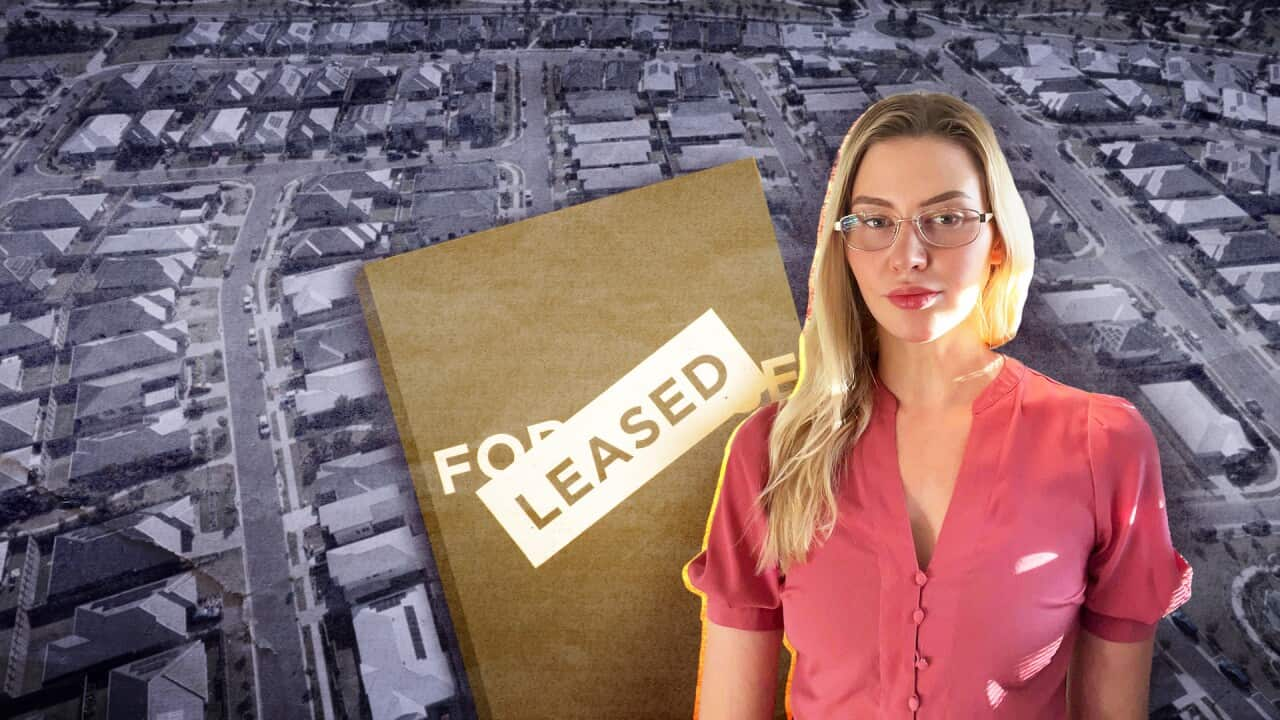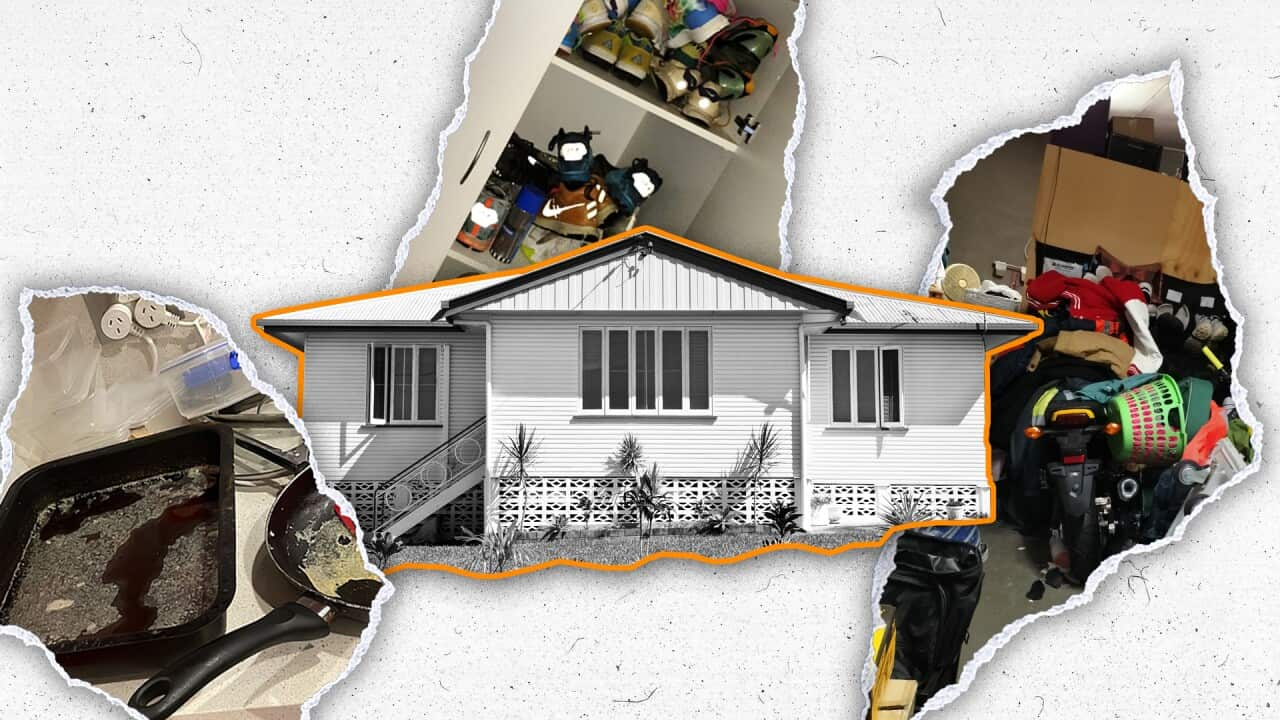Dateline investigates the impact of short-term holiday letting on housing security. Watch the episode Scotland's Airbnb Crackdown. Tuesday 4 April, 9.30pm on SBS or stream via
Ariel says looking for a rental property in Brisbane feels impossible.
“I was at inspections with over 50 people,” she said.
“People were offering way over asking price, people were offering six months [rent] upfront.”
Ariel used to rent an apartment in a large Brisbane development. But hundreds of tenants were evicted late last year when the building’s management rebranded the 26-level complex as Airbnb-style accommodation.
While Ariel says she was lucky to have the option of moving elsewhere with her partner, she watched as others in her building faced homelessness.
The impact of holiday lets on the rental market is being felt around the world.
In February, Brisbane’s rental vacancy rate was 0.8 per cent according to a report from Sydney firm SQM Research.
In March, rents surged to a new record high with the median asking rent for houses recorded at $667 per week and for units $521 per week.
“There are only a few listings [and they are] just greedy, greedy prices,” Ariel said.
“Landlords are taking advantage of people’s desperation for a roof over their head. There is no protection against greed.”
There are currently 5,258 active short-term rentals listed in the Brisbane area compared with 2,802 properties available on the rental market in February.
However, separately, a growing market of illegal Airbnb operators complicates an assessment of the rental crisis, with unregistered short-stay accommodation only expected to increase in the lead up to the 2032 Olympics.
Landlords are taking advantage of people’s desperation for a roof over their head. There is no protection against greed.Ariel
Ariel has turned to social media-based activism and regularly writes to state and federal members with the stories of those in her community.
“Homelessness is growing. I’m speaking to women who are sending their children to school from tents,” Ariel said.
“I myself have been homeless. I grew up in poverty. We were always having to move around, find new rentals, change schools and live in a YHA while looking for a rental.
“I think that’s caused an elevated anxiety.”
Action on short-term lets
Ariel’s activism on TikTok helped to attract 14,496 signatures on an e-petition calling for a Royal Commission into the National Housing Crisis, and an investigation into whether the right to an adequate standard of living has been violated under the Universal Declaration of Human Rights.
The petition has been presented to federal parliament.

Ariel's activism on Tik Tok, included gathering signatures to a petition calling for a Royal Commission into the National Housing Crisis.
“It’s unacceptable for the government to sit on their hands while property investors turn good, long-term homes into hotels,” MacMahon said.
“Across Queensland, whether in South Brisbane or our regional tourism towns, investors know they can make a quick buck from wealthy tourists while families sleep in cars.”
The Queensland Greens proposed an Empty Homes Levy, targeting investors who deliberately leave residential properties vacant. The proposed bill will tax short-stay landlords an annual 5% levy on the value of their residential property if has been vacant for six months in a year.
MacMahon says the bill is responding to staggering community-based evidence.
“Nearly every day, especially as we get to holidays like Easter, my office hears from ordinary renters who are being evicted just so an investor can turn a perfectly good home into an Airbnb.”

Greens Member for South Brisbane, Amy MacMahon. Credit: Queensland Greens
A 50 per cent transitory accommodation rate hike applies to an entire property used as short-term accommodation by paying guests for more than 60 days a year.
The initiative is said to encourage more properties to become available on the long-term rental market.
Other drivers behind the rental crisis
The Australian Housing and Urban Research Institute named short-term rentals as one of the driving forces behind unaffordable and unavailable rental housing along with internal migration, international borders reopening and population and household growth.
An Australian Bureau of Statistics report released in September said Queensland had the fastest growing population over the year to March 2022.
Queensland’s Minister for Communities and Housing Leeanne Enoch together with Premier Annastacia Palaszczuk have pointed to population growth as a key indicator behind low vacancy figures.

Queensland Deputy Premier, Steven Miles, Treasurer Cameron Dick, Premier Annastacia Palaszczuk and Housing Minister Leeanne Enoch are seen during the Queensland government's housing crisis summit at the Brisbane Convention & Exhibition Centre in Brisbane, October 20, 2022. Source: AAP / Darren England
“Since 2015 the Palaszczuk government has commenced 5,299 social housing dwellings across Queensland, and we are on track to meet our target of 13,000 commencements by 2027,” Ms Enoch said.
‘Short-term cash cows’
Short-term letting sites like Airbnb were originally envisaged to service single rooms or apartments but have evolved to include entire three- or four-bedroom homes; what Trevor Rawnsley, CEO of the Australian Resident Accommodation Managers Association (ARAMA), calls the “party house.”
In Brisbane, 80 per cent of all active rentals are entire homes.
ARAMA maintain that these sites are useful when they provide traditional holiday letting. It is when suburban family homes are transformed into “largely vacant short-term cash cows” that concern arises.
“[Holiday lets have] now morphed into this monster that is eating up residential homes,” Rawnsley said.
Mr Rawnsley argues that the appeal of Airbnb encourages landlords to take properties off the long-term market for increased chances of success in the short.
“It’s a very good product. And that’s the problem. It’s so good that investor owners are using Airbnb to generate wealth,” he said.
“[Airbnb is] creating a housing crisis through their success.”
Mr Rawnsley touts the solution as one that incentivises rather than punishes, such as the removal of stamp duty for real estate purchases.
“Taxation is not the solution. The solution is that there needs to be some incentives created for investors to turn their investment to the long-term rental market.
“Or better still, sell it.”
Limiting a second income?
Airbnb has said it wants to contribute meaningful solutions to tackle housing supply and affordability.
Michael Crosby, Airbnb’s Head of Public Policy for Australia and New Zealand, supports the idea of an opt-in tourism levy to ultimately fund community infrastructure such as key worker housing projects.
"Airbnb is committed to working with state and territory governments to enable local councils to establish a tourism levy applied to all accommodation providers,” Crosby said in a written statement to SBS Dateline.
He said many people are looking for a second income during Australia’s cost of living crisis.
“It’s no surprise that we’re seeing many people rely on hosting to make ends meet in the face of the current economic climate.”
“In a 2021 survey, more than a third of Australian Hosts said one of the reasons they host is to earn money to help cover the rising cost of living, while almost four in 10 said that hosting income has helped them stay in their home.”
It’s no surprise that we’re seeing many people rely on hosting to make ends meet in the face of the current economic climate.Michael Crosby
MacMahon says this is yet another attempt by Airbnb to profit.
“Airbnb’s only motivation is to make money. It’s unrealistic to suggest that an opt-in tourism levy can solve a crisis Airbnb already benefits from.”
Rawnsley echoed the same sentiment.
“They're trying to make money at the expense of Queensland families.”
Airbnb maintain that tourism levies are a fair and sustainable way to raise revenue for communities in high-tourism areas.
“[Levies] broaden the revenue base without imposing an additional burden on local ratepayers or businesses,” Crosby said.
Ariel is one month away from her lease renewal notice. She expects another rent increase.
“I’ve never had housing stability my entire life. I have worked really hard to get in a good position in life yet no matter… how much I climb the ladder I still can’t get there.
“It is so dehumanising.”
Scotland’s Airbnb crackdown
Brisbane is hardly an outlier, with similar impacts being felt in cities around the world.
The number of available rental properties in Edinburgh has more than halved since 2020. With over 200,000 people on social housing waitlists and the rental market over inflated, the government is taking radical action to strip back holiday lets and return thousands of properties to residential use.
In a world first, all holiday letting hosts in Scotland will need a licence to operate. Licences will only be granted to properties that adhere to a strict criterion as laid out by local councils.
Watch the episode 'Scotland's Airbnb Crackdown', Tuesday 4 April on SBS at 9.30pm or stream via












